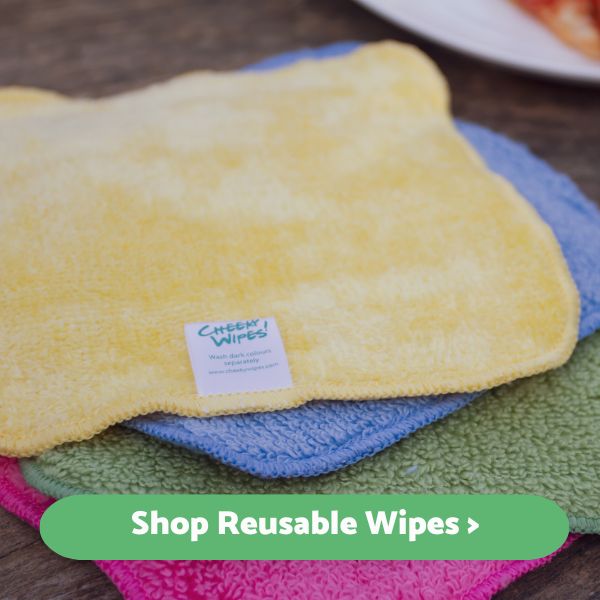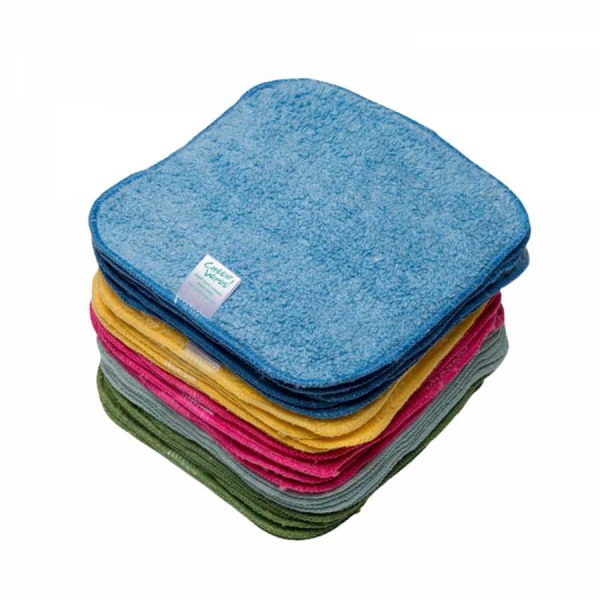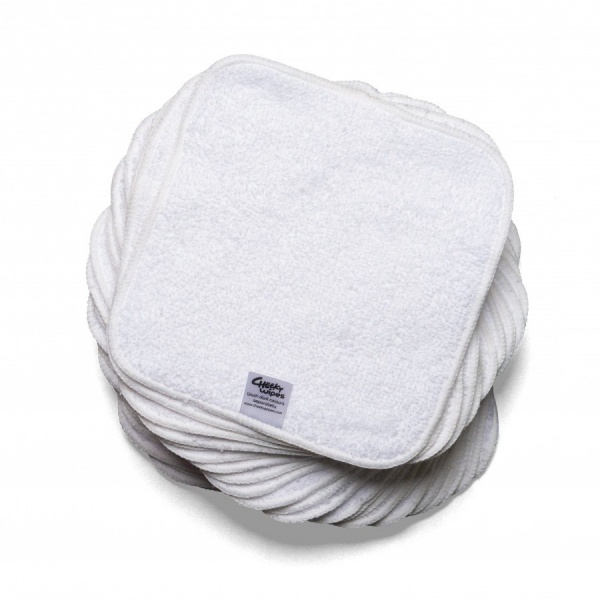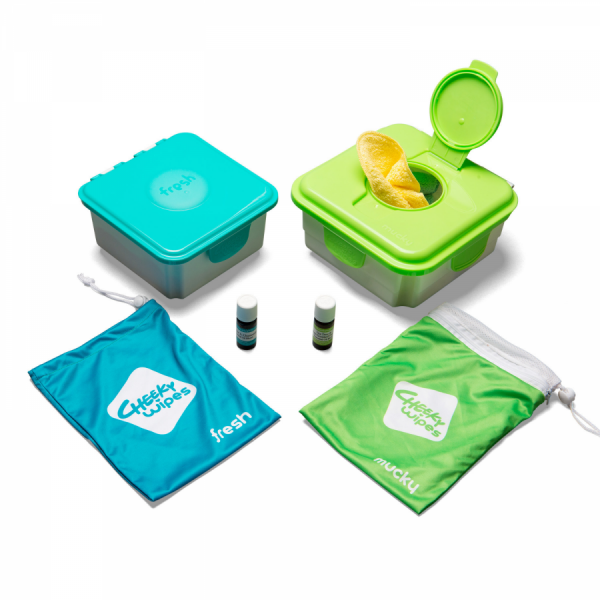Are Reusable Wipes Better for the Environment than Disposables?
Wondering if reusable wipes are friendlier to our planet than disposable ones? The answer is a resounding yes, reusable wipes are better for the environment than disposables.
Here at Cheeky Wipes, we've been all about 'Simple Reusables' since we launched our OG reusable wipes kit back in 2008. The combo of eco-friendliness, money saving and being kind to sensitive skin was just what we needed but couldn't find ourselves in the marketplace at the time.
We never liked disposables. Partly due to the chemicals in them as we all have sensitive skin. But also because disposable wipes are exactly that, disposable and end up as waste in landfill. There, they can take a long time to break down, especially if wrapped with disposable nappies in a plastic nappy sack.
On the flip side, reusable wipes offer a different story. They're simple to use as the clean wipes are just soaked with water and essential oil solution. They're then washed in the washing machine and reused. They can be used hundreds of times and are biodegradable after their lifespan.
You don't have to use reusable nappies to use reusable wipes.
Many parents choose reusable wipes because they can't commit to nappies, however their child has sensitive skin, or they're attracted by the eco nature of wipes. Plus of course they'll save money when choosing reusable wipes!
"Brilliant kit to get me started with eco friendly reusable wipes for my little son. Having the boxes for at home and the travel bags are amazing and so easy to use. Love that the mucky bag has the detachable wash bag inside it so you can just put them straight onto the washing machine." Emma, Trustpilot
Materials
The materials used in wipes play a vital role in their environmental impact.
Disposable wet wipes used to contain plastics like polyester, making them non-biodegradable and challenging to break down. However in the UK, retailers such as Tesco, Boots and Aldi have banned wipes containing plastic. The UK government is also consulting with the public about banning wipes containing plastic completely.
Plastic free wipes are a massive improvement for the environment, however the fact remains that these are still a single use item, produced and shipped in plastic. The production and transport of disposable wipes throughout the production supply chain has a massive carbon footprint and uses a lot of water too.
Reusable Wipe Materials
Reusable wipes are manufactured from various materials like cotton, bamboo, or microfibre.
These materials, especially organic cotton and bamboo wipes, are more environmentally friendly options as they are biodegradable and can break down naturally after use, reducing their environmental footprint significantly.
Reusable
One huge benefit of using reusable wipes is that after you've finished using them for your children, they often still have lots of life left!
You can then:
- sell them on to someone else
- use them as reusable toilet paper
- use them as cleaning rags
"Nearly four years use with ours, we gifted a set! Despite nearly 2 years done now with nappies and having bought our cheeky wipes before they were even born, they are still going strong for mucky faces and fingers! We decided to gift a set for our friends with a new baby and we hope they enjoy them as much as we did. 10000 times better than wet wipes both for baby and the environment. 100% recommend. So easy to clean, just chuck the dirty wipes in the wash either with your cloth nappies or general laundry." Bethany, Trustpilot
Recyclable
One of the key benefits of reusable wipes is their recyclability. Unlike disposables that end up as non-recyclable waste, most reusable wipe materials, such as cotton or bamboo, can be recycled after their lifespan. This further minimizes waste and supports a circular economy.
Biodegradable
The biodegradability factor sets reusable wipes apart. While disposables can linger in landfills for centuries, at the end of their lifespan, reusable wipes made from natural materials break down more swiftly, leaving behind minimal environmental impact.
Which Reusable Wipes Are Best for the Environment?
The reusable wipes which are best for the environment are organic cotton or bamboo which can be sustainably sourced. We think that Organic cotton is slightly more eco friendly as it is more durable than bamboo. Our organic cotton wipes should easily last for several years. Look for GOTS approved material, so you know your organic cotton wipes are sustainable.
Summary
Choosing reusable wipes instead of disposables is an easy eco swap, which will also save you money.
By opting for reusable wipes, you're choosing to reduce landfill and plastic waste. For more information on eco-friendly choices, browse our range of bestselling wipes and cleaning solutions.
Bestselling Eco Reusable Wipes:
Got questions or aren't sure where to start with reusable wipes? We can help! Try our 'wipes questionnaire' for tailored advice on which wipes will suit you best. Alternatively, drop us a line, the team chat pee, poo and periods all day long and will be happy to help!
Lastly, if you enjoyed this article, you may also enjoy these:
- Reusable vs. Disposable Baby Wipes: Which is Best?
- How Long Do Reusable Baby Wipes Last?
- Are Reusables a Hassle?
- The Ultimate Guide to Eco-Friendly Potty Training
- 7 Top Tips to Save Money on Toilet Paper
About the Author: Helen Rankin founded Cheeky Wipes, the original reusable wipes kit back in 2008 after disposable wipes caused her eczema to flare up. Several years later their range of 'Simple Reusables' expanded to include period pants, reusable panty liners and reusable sanitary pads.
The Cheeky customer services team pride themselves on providing honest, friendly advice and just LOVE to chat pee, poo and periods all day long, helping people make the switch to reusables! The Company was recognised for their hard work in developing environmentally friendly products with the Queens Award in Enterprise for Sustainable Development in 2021.


.jpg)

.jpg)

.jpg)
.jpg)
.jpg)
.jpg)